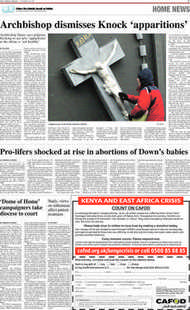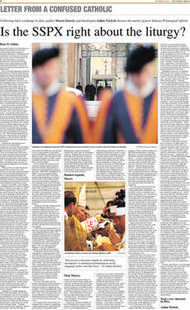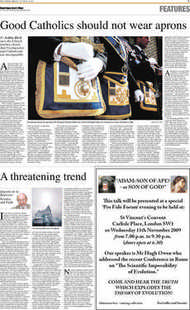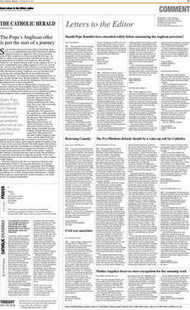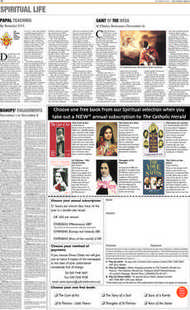Page 13, 30th October 2009
Page 13
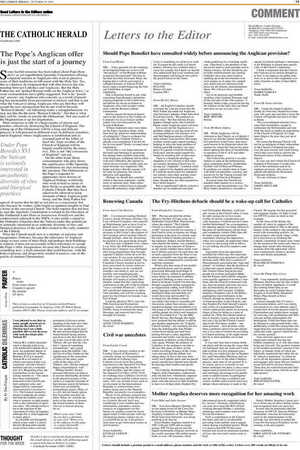
Report an error
Noticed an error on this page?If you've noticed an error in this article please click here to report it.
Tags
Share
Related articles
Cardinal Sends Invitation To Methodists
‘why Didn’t We Think Of This Before?’
By Ed West
Talks With Methodist Youths
Irish Church Leaders To Attend Methodist Service
In Brief News From Around Britain
The Fry-Hitchens debacle should be a wake-up call for Catholics
From Elizabeth C Sweeney SIR – Having attended the debate (Report, October 23) last week, at Methodist Central Hall, Westminster, where the motion “The Catholic Church is a force for good in the world” was put forward for scrutiny, I feel I had to write to express my disappointment at the lack of a clearly audible (and visible) Catholic presence in the audience. Indeed, Zeinab Badawi, who chaired the debate, was compelled to inquire (in the interests of fairness, as she stated) whether there really were any Catholics present, for each time she invited a question from the floor it was almost invariably one from the opposition, often accompanied by cynical and sneering comment.
What a pity that some of our erudite and spirited priests and lay people, possessing thorough knowledge of Church history, skilled in apologetics, (most likely) accustomed to debates and quick thinking to boot were not there to be heard. Could it be that they thought a popular debate arranged by an organisation calling itself Intelligence Squared would be a far from intelligent affair and therefore not worth their time and trouble? As it turned out, the debate (almost inevitably) did come to resemble pub discussion, rather than serious, openminded exchange, but nonetheless it is still going to be broadcast to around 80 million people (in Africa and America) on the November 6 or 7 by the BBC World Service. But though she might have guessed that the debate would be just another opportunity for “Catholic Church bashing”, this certainly did not deter the indefatigable Ann Widdecombe from taking part and from putting forward a calm, dignified, reasoned and totally convincing set of arguments in defence of the Church, once again. Perhaps the absence of Catholics in the audience was due to the fact that many of them, living within travelling distance of the venue, were unaware that the debate was taking place. If this is the case, then surely our Catholic press and our parish priests should have alerted (and should be alerting) their readers and parishioners.
The Catholic Archbishop of Abuja, Nigeria, John Onaiyekan, understood only too late how vehemently opposed to the Church were the many participants who had arrived in their hundreds to hear two of their idols, Stephen Fry and Christopher Hitchens, scoff and spit venom at the Church while, it must be said, raising one or two issues worthy of serious consideration and valid response. Could he not have been briefed beforehand? As a consequence, his opening speech was lame (almost to the point of indifference), all too brief and completely wasted. Only later did he make some most pertinent comments silencing the opposition, when, for example, he stated that when it comes to discussing Aids in Africa we are talking about his nephews and nieces.
Arguments from the opposition included the following: the claim that anti-Semitism was preached as official doctrine until 1964; that a cardinal of Massachusetts sanctioned the “rape and torture” of children; that the doctrine of Limbo had caused untold suffering; that Thomas More had persecuted people for owning an English Bible, that the Islamic and Catholic religions were equally opposed to women’s freedom; that the Church is obsessed with sex; that our priests and nuns are sexually dysfunctional; the practice of indulgences; the Crusades; Catholic charities; Purgatory (not in the Bible); paedophilia (most definitely in the Church, though no mention was made of homosexuality in the Church); and that Stephen Fry feels himself a perennial victim of a judgmental Church which continuously points its accusing finger at him for being in a state of mortal sin. (Why this should unnerve him is anyone’s guess, since he does not care a fig for the Church’s teachings in the first place; neither – one must presume – does he know what three conditions need to be met before one is in a state of mortal sin according to Church teaching, or he might realise that he is most probably not in that state.) It was only later that evening, thinking about and discussing the issues that we had heard, that my sister and I were able to think of a few poignant questions that we might have put to Stephen Fry and Christopher Hitchens, had we been, like a few of the other Catholics present, more sure of our ground. It is, of course, up to us to ensure we are better informed, but there is also a most urgent need at parish level to actively and untiringly encourage every parishioner to attend courses in apologetics and for us all to take a confident and clearly audible stand at each and every debate where reference is made to the Church. We require for this powerful and magnetic leaders. Fr John Corapi (on EWTN) comes to mind as one example.
At the close of the debate, the number of voters in support of the motion plummeted to 206, to the great hilarity of the audience who greeted the result with resounding guffaws. In some respects, this result stings a little, but it also leaves us doubting the Catholic credentials of those who voted for the motion at the outset only then to change their minds after listening to accounts from the opposition which were continuously emotive, acrimonious and deeply prejudiced.
Yours faithfully, ELIZABETH SWEENEY By email From Mr Philip Diaz-Lewis SIR – I am repeatedly disillusioned by Hitchens, Dawkins and the like in their choice of debate opponents. I would like nothing better than to see them take on such Catholic heavyweights as Scott Hahn, Benjamin Wiker, Peter Kreeft or Dave Armstrong.
I always thought that if I were a professional atheist, and I was utterly convinced of my own atheism, then I would track down the greatest mind in Christendom and debate them, instead of worrying with archbishops and MPs who are neither philosophers nor theologians. I find that these men can be likened to a playground bully, who deliberately avoids the strong kids who might beat him and instead attacks the small and weak, against which he has his victory assured.
Time and time again have such claims been refuted, leaving one baffled completely as to why they keep being put forward. The greatest weapon in the modern secularist’s arsenal is not fallacy or slander (both of which are habitually employed) but rather the art of “selective ignorance” in which he views all the arguments against him, and engages only those that are childish or put forward by obvious fanatics. Those that are well-informed and intelligent he simply pours ridicule on and then ignores.
Yours faithfully, PHILIP DIAZ-LEWIS By email
blog comments powered by Disqus




